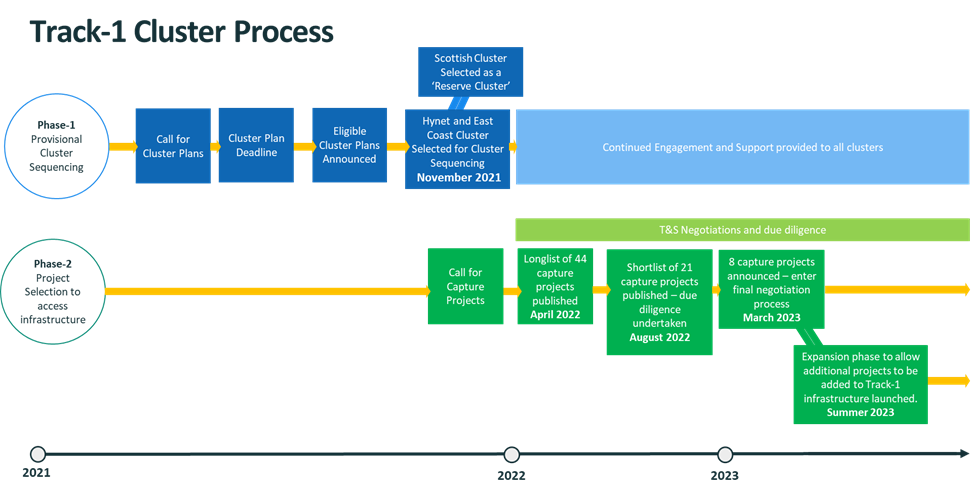At the CCSA we’ve been taking some time to reflect on the momentous announcements over the past few weeks. I’m delighted to finally see the decades of hard work and collaboration between industry and government come to fruition. This is a pivotal moment which fires the starting gun on the UK CCUS industry.
The Government’s Spring Budget announced £20billion of funding had been allocated for CCUS projects, an unprecedented recognition of the importance of CCUS in delivering net zero and boosting the UK’s economic growth. The funding means the initial Track 1 CCUS clusters can truly start moving forward with the first eight projects – a critical springboard for the UK industry to further develop and a kickstart for the decarbonisation of North-West and East Coast of England. The funding will provide operational payments to cover the use of carbon capture on power, industry and hydrogen production and this will unlock private sector capital for its construction. These eight projects will collectively capture and store around seven million tonnes of CO2 a year and create thousands of jobs.
These projects are just a small proportion of what is required to reach Net Zero. But they represent just one tenth of the current project pipeline, demonstrating the scale of the opportunities in front of us. Last year the CCSA identified over 70 million tonnes of carbon emissions from around the UK which could be abated with Carbon Capture and Storage by 2035. Delivery of all of these projects would keep the UK on track with its Net Zero Strategy trajectory and provide significant economic benefits to disadvantaged regions.
Critically, this is not just a Net Zero opportunity. The CCUS pipeline can provide 70,000 new jobs, as well as protecting 77,000 existing jobs, across the UK’s industrial heartlands, all while positioning our country to export low carbon products and CCUS skills and services around the globe. There is more to do and the necessary next steps are set out in Chris Skidmore MP’s Net Zero Review recommendations.
We urgently need to see a clear CCUS deployment plan for the whole of the UK. To have a fighting chance of reaching Net Zero and leading the low carbon industries of the future, it is vital all of the industrial clusters across the UK get up and running with carbon capture and storage as soon as possible.
Delivery of this plan offers an exciting, near-term opportunity to put our industrial regions at the forefront of the next industrial revolution – leading the way in the transition to a global low carbon economy in the same way as British industry led the world in the first industrial revolution. So great is this opportunity – the kind that only comes every few hundred years – other countries are racing to take up the mantel. Both the US Inflation Reduction Act and the EU’s Green Industrial Plan and Net Zero Industry Act set out powerful CCUS measures. We risk falling behind despite the UK’s 18-year head start (the CCSA was established in 2006).
We need a longer-term commitment to remain an attractive proposition to investors and to develop our own supply chain. Ahead of the Spring Budget, the CCSA made a Budget Submission requesting funding to cover the period to 2035. We believe this would provide sufficient forward visibility to develop a UK-based supply chain capable of both servicing the UK project pipeline and exporting technology and services to other emerging CCUS markets. We will keep up the pressure on the Government to deliver this.
The recently announced Track 1 expansion will provide an important opportunity for the remaining shortlisted projects, as well as new projects. The expansion will launch later this year and government is expected to engage with the sector on delivery shortly. We urgently need to see more detail before the summer regarding the timeline for the expansion, the eligibility criteria, and what the industry can expect going forward.

The Track 2 process for the next two CCUS clusters was also launched at the end of March. It’s important this process moves forward quickly if the UK is to meet its 2030 target of storing up to 30 million tonnes of CO2 a year. However, we are still awaiting further details on the timeline and criteria for selecting capture projects under Track 2.
The Chancellor has said he will be setting out the UK’s response to the US Inflation Reduction Act and the EU Net Zero Industry Act this Autumn. While I am relieved to hear the UK will not sit back and shrug its shoulders as good people and projects leave the UK, the question on everyone’s lips is “can he afford to wait that long?”. Boards are already impatient to see the case for continued and new investment here in the UK. It is time for the government to set out its stall – persuasively – and action a swift response: every week counts in the race to build this industry.
There is a powerful case to make. The UK is blessed with significant CO2 storage capacity in the North Sea and the East Irish Sea, and a strong offshore skills base, both of which make us uniquely placed to become one of the global leaders on CCUS deployment. Critically for long term planning, there is widespread political consensus around CCUS’ vital role in reducing industrial emissions and enabling a Net Zero power system, as evidenced by the recent second reading of the Energy Bill in the House of Commons. The Bill provides an investable regulatory framework for CO2 transport and storage and world-leading carbon capture business models that minimise subsidy and provide long-term contractual certainty to investors.
All that is needed to create a haven for CCUS development is an injection of confidence to take the big decisions, to accept some inevitable risks and to set aside any philosophical discomfort with the “build it and they will come” approach which is being pursued elsewhere. The UK has developed a strong framework for a new industry – it just needs to turn on the funding tap and watch the inward investment flood in.
The counterfactual of continuing to constrain the roll-out of CCUS through extended allocation processes will slam the brakes on the UK economy as private investment across a range of key ‘economic lifeblood’ sectors, such as manufacturing, energy and transport is either put on hold or finds another home. Where civil servants and regulators need more resources to move at pace they should be given them, and quickly. There is no option for the UK economy to stand still in this global race for the ‘once in a century opportunity’ – we have to speed up or we will be left behind.
The UK’s CCUS policy has made tremendous progress in the past few months. I’m thrilled the industry is finally able to advance towards delivering the first eight projects on the ground. It really does feel like the official beginning of CCUS implementation in the UK.
Just think what could be achieved with a bit more ‘bounce’ in the springboard.
Current CCUS cluster proposals in the UK
